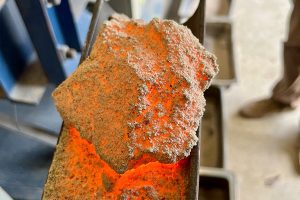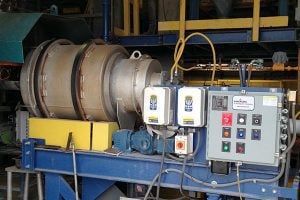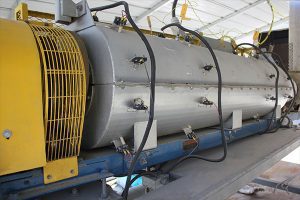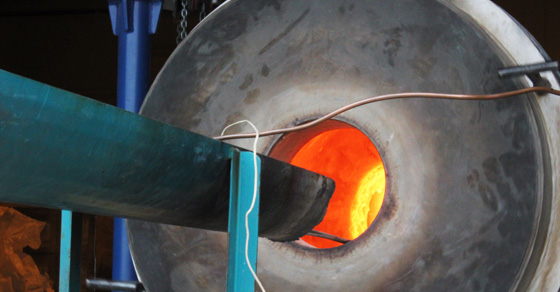The rotary kiln testing carried out in the FEECO Innovation Center is often critical to gathering process data and developing the groundwork for a safe, efficient, and effective thermal processing operation. This testing gives producers the opportunity to predict how their material will behave in a kiln, as well as how the commercial kiln must be designed in order to produce the desired results.
Here’s a look into why this testing is so valuable, how the testing process works, and the options producers have at their disposal when testing with FEECO.
Why Use Rotary Kiln Testing?
Rotary kilns use extremely high temperatures in order to cause chemical reactions or phase changes in material. They are frequently used in the production of advanced materials such as catalysts and adsorbents, which require precision processing capabilities, making process development testing vital to success. Further, they are regularly applied in novel settings or with new material derivatives.
Testing is useful in a multitude of rotary kiln processes. Commonly tested processes include:
- Thermal desorption of organic/hazardous wastes
- Heat hardening
- Organic combustion
- Metal recovery
- Calcination
There are also many different types of settings in which it may be desirable to conduct rotary kiln testing:
Commercial Rotary Kiln Sizing & Design
Perhaps the most common reason for testing is to gather the data necessary to size and design a commercial-scale kiln for an intended application. In this setting, the desired set of product parameters has typically been determined, but the process needed to reach those qualities is unclear or requires refinement.
Product Development
Producers may also be looking to develop a new or enhanced product. While this can occur in any industry, a common example is seen in catalyst preparation, where calcination plays a central role in bringing about the desired characteristics of the end product.
In such cases, the FEECO Innovation Center can help to refine product characteristics through testing, as well as produce small samples for use in field trials.

Sample of material pulled from a test rotary kiln during process development trials
Process Confirmation
Testing is also useful in determining if a particular process holds potential for a commercial-scale operation; producers come in with an idea and maybe even a sample of material, which can then be trialed for technical and economic feasibility.
This type of rotary kiln testing is often seen in the reclamation of valuable materials such as metals from wastes. Many waste materials have previously been landfilled despite containing a valuable component, because the value was inaccessible or not recoverable in the waste’s existing form. Advanced thermal processing techniques have opened the door to the recovery of these valuable components, allowing a company to test a material to see if the valuable component could be recovered from the waste material in an economically viable way.
To Test Variable Process Conditions
Another common reason for rotary kiln testing is the evaluation of alternative processing conditions. Many customers may have an existing thermal system, but are looking to adjust the process, or feel that their current process could be improved upon. Rotary kiln testing in this aspect allows them to try out various process conditions without experimenting on their existing kiln or affecting production schedules.
How Rotary Kiln Testing Works
Testing with rotary kilns is commonly conducted first at batch scale and then at pilot scale.
Batch-Scale Kiln Testing
Batch testing is a cost-effective way to test small sample sizes and gather initial process data, such as time and temperature profiles. Batch test work also helps to define the process parameters needed for continuous pilot-scale testing.

Direct-fired batch rotary kiln used for testing
Pilot-Scale Kiln Testing
Pilot-scale test work is done on a much larger scale than batch testing, allowing for a continuous process loop to be tested, and commercial process conditions to be simulated.

Indirect-fired pilot-scale rotary kiln used for testing
During both batch and pilot testing, samples can be regularly withdrawn from the test kiln in order to determine the material chemistry and physical properties at various intervals. Material characteristics such as those listed below are commonly analyzed to ensure a product is meeting desired specifications:
- Flowability
- Compression strength
- Bulk density
- Crush strength
- Chemical analysis
Gathered process data can then be used to produce the desired product specifications and aid in process scale-up, establishing parameters and conditions such as:
- Residence time
- Kiln slope
- Temperature requirements
- Kiln speed (RPMs)
- Emissions
- Feed rate
Available Rotary Kiln Testing Equipment
Both direct-fired and indirect-fired kilns can be tested in the FEECO Innovation Center, at both batch and pilot scale. Direct-fired kilns are capable of testing co-current and counter-current air flow configurations, and a variety of optional equipment is available to accommodate various process needs. Optional testing equipment includes:
- Combustion chamber
- Afterburner
- Baghouse
- Wet Scrubber
- Removable flights, dams, and bed disturbers
Conclusion
Whether developing a new thermal process or enhancing an existing one, thorough testing such as that offered by the FEECO Innovation Center is vital to developing a safe and successful commercial-scale rotary kiln operation. From initial batch and feasibility testing, to process scale-up, the Innovation Center is equipped for all of your rotary kiln testing needs..
FEECO uses the data gathered during testing to engineer and manufacture a custom rotary kiln according to the necessary specifications. For more information on rotary kiln testing or our custom rotary kilns, contact us today!

